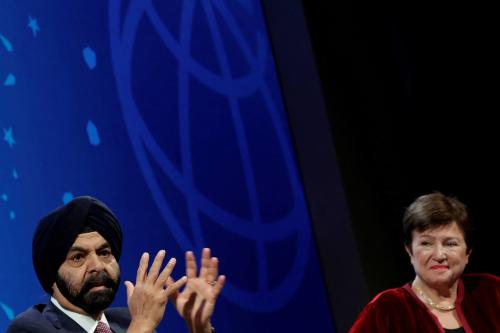In April 1986, Soviet lies turned the world’s worst nuclear disaster at Chernobyl into a larger human tragedy. Twenty years later, lack of transparency in Ukraine’s energy sector again threatens Ukraine’s sovereignty, this time due to murky gas deals, set to expire in June. Unlike in 1986 when Soviet leaders tried to cover up Chernobyl’s threat, Ukraine’s leaders now have the opportunity to respond to alarm bells in the gas sector and forestall an impending danger to its own sovereignty and European energy security.
The Chernobyl tragedy was symptomatic of what was fundamentally wrong with the Soviet Union: false promises about technology, disregard for the environment, secrecy and obfuscation, and greater concern for national prestige than for its own people.
It was appropriate and ironic that reform of many of those Soviet practices secured Chernobyl’s closure in December 2000. For years, Ukraine’s leaders refused to consider closure, arguing that it would cause blackouts and threaten industry. In fact, Ukraine had excess capacity, but lacked market prices and systems to collect revenues in order to pay for fuel, replace obsolete plants, and ensure adequate supply. Electricity reforms that began in 2000 now allow Ukraine to export electricity to Hungary and Slovakia.
Today another form of potential energy tragedy threatens Ukraine — the country’s dependence on imported gas and shady contracts. The cutoff of Russian gas in January demonstrated Ukraine’s reliance on external supply and its vulnerability to political pressure. The deal Ukraine and Russia negotiated to restore supply does not protect Ukraine’s interests or reflect normal market practices:
- The contract does not ensure stable prices for Ukraine past mid-year, nor do the terms provide for a predictable, non-politicized procedure for setting future prices (as in Russia’s gas deals with Germany and France).
- Russia does not guarantee to supply minimum volumes but, rather, may supply gas up to a stated ceiling. In other words, Russia decides what it wishes to supply.
- Ukraine guarantees Russia access to its gas transit system but Russia is not required to pay if that capacity is not used.
- The gas pipeline tariff for Russia is set for five years, with no escalator clause, even though Ukraine’s gas import price is only fixed for six months.
- Transit rights and sole gas import rights are given to a new company, RosUkrEnergo, that does not have physical or financial assets that can be seized if it does not meet its obligations, and whose ownership structure is murky and possibly associated with organized crime.
Ukraine has already fallen into serious arrears under the new agreement with Russia. It is unclear why revenues from gas sales and transit have not covered Ukraine’s payment obligations. We can write the scenario now for what will happen in June when the current price deal expires. As it has in other countries, Russia may well seek as payment a “fire sale” ownership stake in Ukraine’s gas system or in major gas-consuming industries, which are the lifeblood of Ukraine’s economy.
If Ukraine’s new leadership is committed to acting on the lessons of Chernobyl, it will seek international help to restructure these agreements and will be fully transparent about the supply arrangements.
Forestalling a crisis is also in the interests of the EU, United States and Russia. The EU cannot afford to be passive. Almost all European gas imports from Russia — nearly one-third of Europe’s gas supply — transit Ukraine. The United States hardly needs another crisis in the Russia relationship as we seek Russia’s help in preventing a nuclear Iran. Russia needs neither an irate European customer nor a fight with diplomatic partners seeking to prevent an Iranian nuclear bomb.
Some practical steps:
- Ukraine’s leaders must break with past practices of corruption and lack of transparency in the energy sector. Ukraine should seek international help in addressing its gas supply problems and technical assistance in reviewing the terms of existing contracts.
- The EU and the U.S. should engage Ukraine and Russia before the crisis erupts and offer to facilitate negotiation of normal commercial arrangements.
- The World Bank, EBRD and bilateral donors should support programs in Ukraine to increase energy efficiency and to create and enforce regulations that promote efficiency and transparency in the gas transit system.
- When the G-8 takes up energy security in its July meeting, transparency in market structure, ownership, and supply arrangements, as well as fair competition and access to transit infrastructure, should be core themes. Russia should welcome such discussions as being in its long-term interests.
Ukraine’s friends have reflected on Chernobyl and said “never again.” Today, “never again” means that Ukraine’s friends and its leaders must work to ensure that lack of transparency in Ukraine’s energy sector does not threaten the sovereignty for which Ukrainians have persevered.



Commentary
Op-edChernobyl’s Lesson: A State’s Lies Threaten its People and its Sovereignty
June 2, 2006